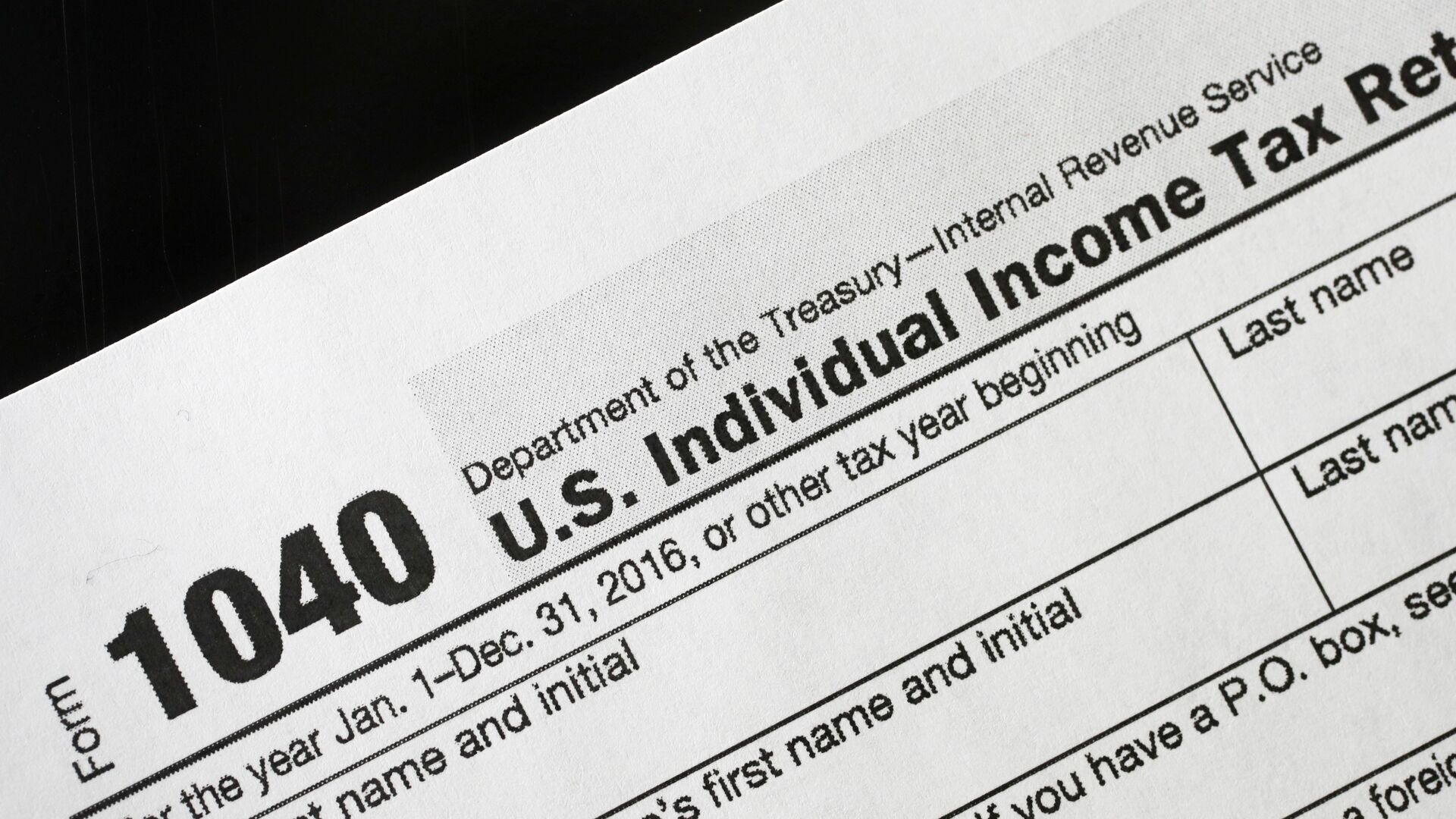https://sputnikglobe.com/20211205/democrats-were-wrong-after-all-irs-data-reportedly-shows-trump-tax-cut-benefited-middle-class-most-1091264065.html
Democrats Were Wrong After All: IRS Data Reportedly Shows Trump Tax Cut Benefited Middle Class Most
Democrats Were Wrong After All: IRS Data Reportedly Shows Trump Tax Cut Benefited Middle Class Most
Sputnik International
After the adoption of Trump's tax code, the Democrats spared no effort to discredit it by claiming that it only benefited those with higher incomes and had... 05.12.2021, Sputnik International
2021-12-05T15:35+0000
2021-12-05T15:35+0000
2021-12-05T15:35+0000
donald trump
us
taxes
https://cdn1.img.sputnikglobe.com/img/105272/78/1052727872_0:0:5472:3078_1920x0_80_0_0_9e79ec166f579c9768ecf7ee8dfb1319.jpg
Data on Americans' income and taxes provided by the Internal Revenue Service (IRS) suggests that the tax reform implemented by the Republicans and President Donald Trump benefited the US middle class the most, while those earning over $1 million per year did so far less, a researcher at the Heartland Institute and The Hill contributor Justin Haskins claims.After analysing the most recent IRS data for the year 2018, the first since the enactment of the new tax code, Haskins found that those who earned between $15,000 and $50,000 per year, benefited from the reform twice as much as those who made over $1 million. The former reportedly got a 16% to 26% tax cut, while the richest Americans enjoyed less than a 6% cut in their taxes.The actual tax cuts for those between these two income brackets ranged between 17% and 9%, Haskins says.The disparity in tax cuts between the low and high-income groups was so large that even adjusted for the size of income, the top one-percenters still saw their share in the overall US "tax pie" increase. At the same time, the middle class' share in the taxes gathered overall in the US decreased when compared to 2017, Haskins indicates. This finding contradicts earlier claims by Democrats, who have insisted ever since the Tax Cuts and Jobs Act was passed in 2017, that the law had been promoted by Donald Trump, a business mogul, in order to reduce the tax burden on rich people like himself. They also claimed that the tax reform did not benefit the middle class the way the former Republican POTUS said it did.Haskins said that the Democrats' statement could not be further from the truth. He also noted that such a mistake in judgement causes concern in light of the changes to the tax system the party wants to implement as a part of Biden's Build Back Better plan. The latter seeks to partially pay for a large boost to the social security and green policies by increasing the tax burden on the highest earning Americans.The 2017 Tax Cuts and Jobs Act reduced income and alternative minimum tax rates, raised the threshold after which estates would fall under the estate tax, and eliminated the penalty enforcing the provisions of the Affordable Care Act. In addition to this, the overhaul increased the standard tax deduction while limiting some of its aspects, such as mortgage interest deduction, and boosted family tax credit. The bill also reduced the tax burden for businesses.While the Trump tax reform effectively reduced the burden for all income brackets, Biden's proposed bill for his Build Back Better plan focuses solely on high-earning Americans who seek to boost their credit and eliminate some of the tax optimisation schemes they might have been using. The bill seeks to reverse some of the changes made in 2017, ramping up corporate tax from 21% to 28%, and will impose 21% tariffs on patents, copyrights, trademarks, and other assets that are not considered a regular income, but which could be used to reduce the tax burden due to the preferential 10.5% rate.
https://sputnikglobe.com/20211008/trump-says-new-york-property-taxes-exceed-his-park-avenue-retail-property-value-1089781360.html
Sputnik International
feedback@sputniknews.com
+74956456601
MIA „Rosiya Segodnya“
2021
Tim Korso
https://cdn1.img.sputnikglobe.com/img/07e6/03/0d/1093831826_0:0:216:216_100x100_80_0_0_e3f43a960af0c6c99f7eb8ccbf5f812c.jpg
Tim Korso
https://cdn1.img.sputnikglobe.com/img/07e6/03/0d/1093831826_0:0:216:216_100x100_80_0_0_e3f43a960af0c6c99f7eb8ccbf5f812c.jpg
News
en_EN
Sputnik International
feedback@sputniknews.com
+74956456601
MIA „Rosiya Segodnya“
Sputnik International
feedback@sputniknews.com
+74956456601
MIA „Rosiya Segodnya“
Tim Korso
https://cdn1.img.sputnikglobe.com/img/07e6/03/0d/1093831826_0:0:216:216_100x100_80_0_0_e3f43a960af0c6c99f7eb8ccbf5f812c.jpg
donald trump, us, taxes
Democrats Were Wrong After All: IRS Data Reportedly Shows Trump Tax Cut Benefited Middle Class Most
After the adoption of Trump's tax code, the Democrats spared no effort to discredit it by claiming that it only benefited those with higher incomes and had little effect on the middle class. Now that they are proposing a tax hike for the rich, new data is undermining their claims and possibly their estimates of the cost of building back better.
Data on Americans'
income and taxes provided by the Internal Revenue Service (IRS) suggests that the tax reform implemented by the Republicans and President Donald Trump benefited the US middle class the most, while those earning over $1 million per year did so far less, a researcher at the Heartland Institute and The Hill contributor Justin Haskins
claims.
After analysing the most recent IRS data for the year 2018, the first since the enactment of the new tax code, Haskins found that those who earned between $15,000 and $50,000 per year, benefited from the reform twice as much as those who made over $1 million. The former reportedly got a 16% to 26% tax cut, while the richest Americans enjoyed less than a 6% cut in their taxes.
The actual tax cuts for those between these two income brackets ranged between 17% and 9%, Haskins says.
The disparity in tax cuts between the low and high-income groups was so large that even adjusted for the size of income, the top one-percenters still saw their share in the overall US "tax pie" increase. At the same time, the middle class' share in the taxes gathered overall in the US decreased when compared to 2017, Haskins indicates.
"Republicans’ tax reform law resulted in the tax code becoming slightly more progressive", the researcher noted.
This finding contradicts earlier claims by Democrats, who have insisted ever since the Tax Cuts and Jobs Act was passed in 2017, that the law had been promoted by Donald Trump, a business mogul, in order to reduce the tax burden on rich people like himself. They also claimed that the tax reform did not benefit the middle class the way the former Republican POTUS said it did.
Haskins said that the Democrats' statement could not be further from the truth. He also noted that such a mistake in judgement causes concern in light of the changes to the tax system the party wants to implement as a part of Biden's Build Back Better plan. The latter seeks to partially pay for a large boost to the social security and green policies by increasing the tax burden on the highest earning Americans.
"The fact is, Republicans’ 2017 tax reform law did exactly what was promised: It lowered taxes for all income groups, provided the greatest benefits for middle-income households, and spurred economic growth that helped reduce poverty and improve prosperity. It would be a grave mistake for Democrats to eliminate key parts of this important legislation", Haskins warned.
The 2017 Tax Cuts and Jobs Act reduced income and alternative minimum tax rates, raised the threshold after which estates would fall under the estate tax, and eliminated the penalty enforcing the provisions of the Affordable Care Act. In addition to this, the overhaul increased the standard tax deduction while limiting some of its aspects, such as mortgage interest deduction, and boosted family tax credit. The bill also reduced the tax burden for businesses.

8 October 2021, 23:07 GMT
While the Trump tax reform effectively reduced the burden for all income brackets, Biden's proposed bill for his Build Back Better plan focuses solely on high-earning Americans who seek to boost their credit and eliminate some of the tax optimisation schemes they might have been using. The bill seeks to
reverse some of the changes made in 2017, ramping up corporate tax from 21% to 28%, and will impose 21% tariffs on patents, copyrights, trademarks, and other assets that are not considered a regular income, but which could be used to reduce the tax burden due to the preferential 10.5% rate.





